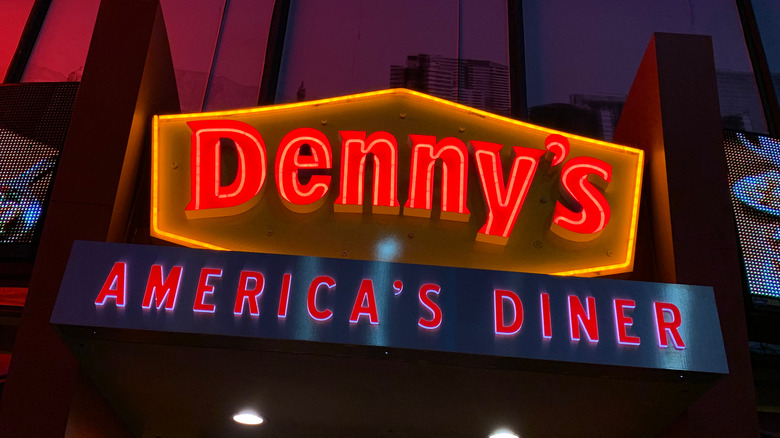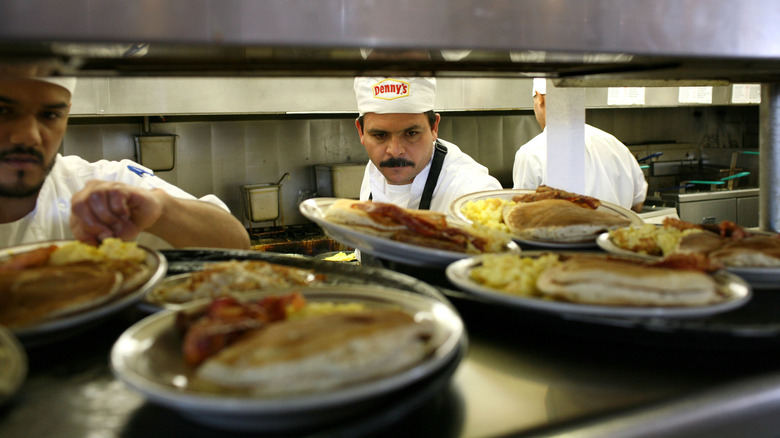The Denny's Racism Scandal You May Not Be Aware Of
What started out as a humble donut shop in the 1950s is now a popular diner-style chain known for its famous Grand Slam, all-day breakfast, and 24-hour operation, notes Denny's. Over the years, Denny's also became known for its partnerships with various charitable organizations, including Save the Children, St. Jude Children's Research Hospital, and No Kid Hungry, which are highlighted under the chain's family and community efforts.
But despite Denny's charitable affiliations over the years, the popular breakfast eatery gained a negative reputation for a racism scandal that tarnished its once-positive, wholesome image. The incidents occurred decades ago, but many people still rightly remember the infamous civil rights lawsuits reported by the Los Angeles Times and other outlets, which involved Denny's locations in California and Maryland and resulted in a massive settlement. Deval L. Patrick, the assistant attorney general for civil rights in 1994, told the popular L.A. newspaper that it was the "largest, most-sweeping nationwide settlement of a public accommodations case in history."
So what exactly happened that led to two class-action lawsuits against the seemingly family-friendly American diner that's "always open," and how has Denny's changed since then?
Racism allegations at California Denny's restaurants
In the early '90s, a number of racial discrimination allegations were made by thousands of customers at various California Denny's restaurants, per The New York Times. Thirty-two Black customers in California sued the chain, claiming their civil rights were violated and that Denny's fosters a discriminatory corporate culture that reached up the management ladder, according to The Washington Post.
One incident took place in 1991 in San Jose. A group of Black teenage students told The New York Times that they were asked to pay a cover charge before even being seated and to prepay for their orders ... But their white classmates, who also dined with them, were not asked anything of the sort.
Another California lawsuit, also covered by The New York Times, involved a 13-year-old girl in Vallejo. At the time, Denny's offered customers a free meal if they dined in on their birthday. But the teen was denied her free birthday meal, even though she had a baptismal certificate with her birthdate on it to prove her age. The restaurant did not accept the certificate, stating that it wasn't sufficient and allegedly embarrassing the young girl publicly.
Although Denny's denied having any type of discriminatory corporate culture that would lead to racial bias, it attempted to make things right with a $28 million cash settlement, recalls the Orlando Sentinel.
Black Secret Service agents lodge a complaint at a Maryland Denny's
Around the same time, similar racism allegations were made in Maryland involving a group of uniformed Secret Service agents in April of 1993, reported The Washington Post. Six Black agents who were seated together walked out of a Denny's restaurant in Annapolis after waiting nearly an hour for their food to arrive. While they waited, their white colleagues and Black supervisor seated at an adjacent table received their food in a timely manner.
The senior vice president for the restaurant chain's parent company told the D.C. newspaper that the wait was the result of the agents' elaborate orders and overall party size (21 agents, total), not the color of their skin. He also insisted that the six Black agents were the last to place their orders. However, some of the agents recalled seeing plates sitting empty on the counter while white patrons who came in after the Black agents were served first.
Coincidentally, this Maryland incident occurred the same day that the California settlement amount was publicly announced. The six Black agents filed their own lawsuit later that year and were added to the list of plaintiffs nationwide, says The Baltimore Sun.
Denny's responds by changing its policies and promoting racial diversity
After the growing list of racial complaints, revealed The New York Times, Denny's ended up paying a total of $54 million to settle all the lawsuits. In addition to the $28 million that was awarded to the 32 plaintiffs in California, another $17 million was awarded to plaintiffs in Maryland and to thousands of others, per the Orlando Sentinel. Following these events, Go Upstate reported that the controversy served as a wake-up call for the chain, prompting it to create a racial-sensitivity program for all employees to prevent future incidents of racism.
The breakfast restaurant's renewed mission to combat racism and promote cultural awareness led to special recognition in 2000: The parent company for Denny's earned the top spot in the "America's 50 Best Companies for Minorities" Fortune magazine survey, per a statement published in 3BL CSR Wire. Six years later, Black Enterprise recognized Denny's as one of the "Best 40 Companies for Diversity" in response to its efforts to promote more inclusive values.
Today, Denny's prides itself on the cultural diversity of its team. The official Denny's diversity statement highlights that 76% of team members are minorities, 58% of locations are owned by minorities, and 56% of board members are minorities, as of October 2022. The racism scandal is an unfortunate part of the restaurant's history, and while combatting discrimination is an ongoing process, Denny's stands committed to "embracing diversity, equity and inclusion throughout the organization," thereby taking responsibility for its past and its future.



